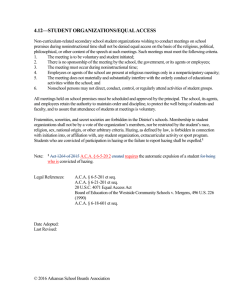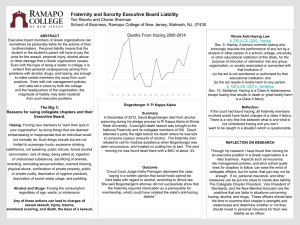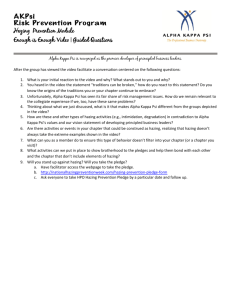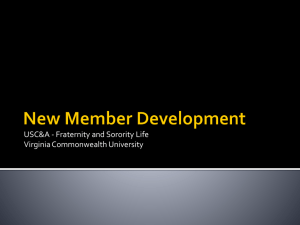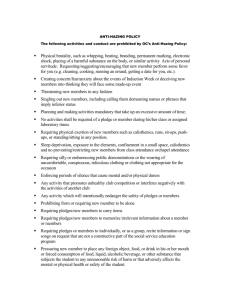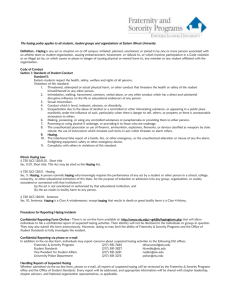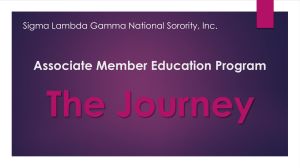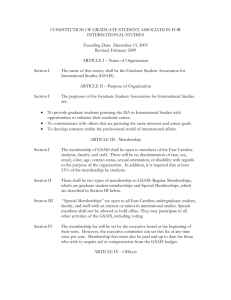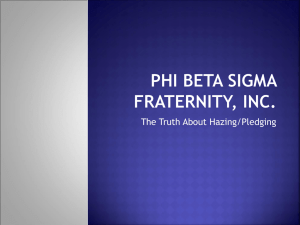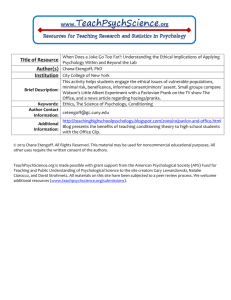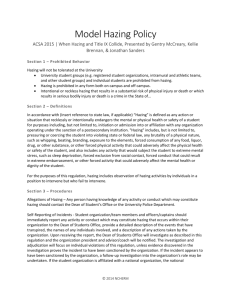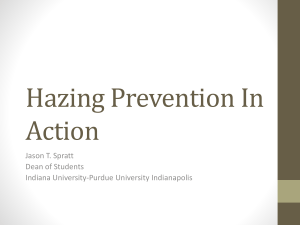Minutes for March 16, 2012 Meeting - University of Florida Student
advertisement
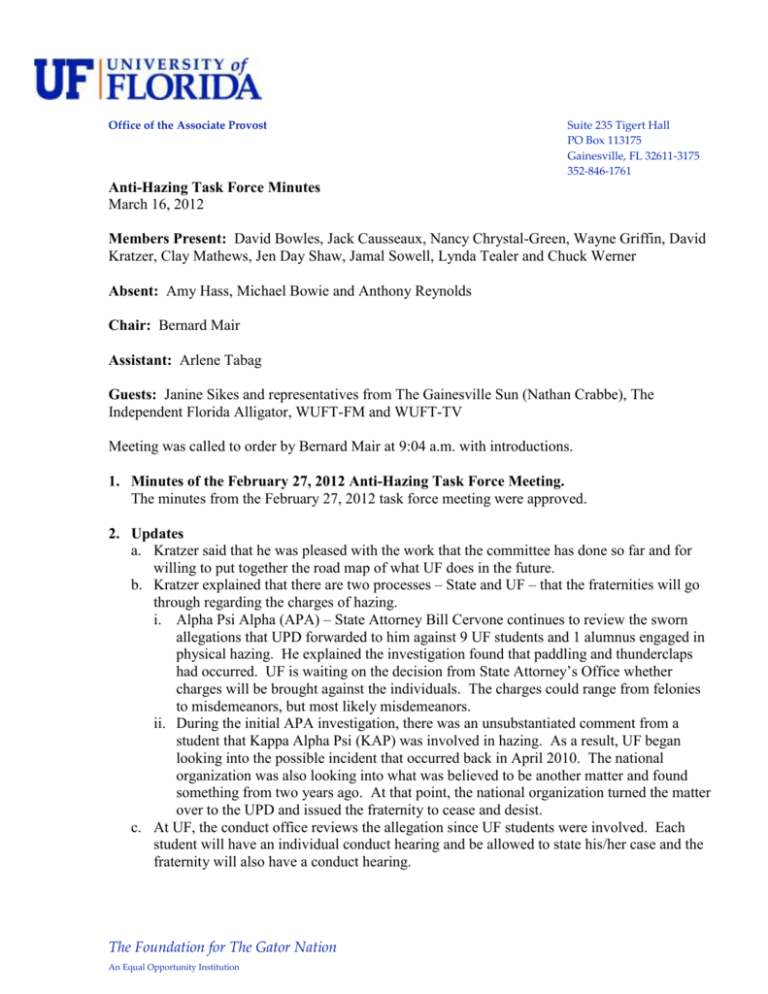
Office of the Associate Provost Suite 235 Tigert Hall PO Box 113175 Gainesville, FL 32611-3175 352-846-1761 Anti-Hazing Task Force Minutes March 16, 2012 Members Present: David Bowles, Jack Causseaux, Nancy Chrystal-Green, Wayne Griffin, David Kratzer, Clay Mathews, Jen Day Shaw, Jamal Sowell, Lynda Tealer and Chuck Werner Absent: Amy Hass, Michael Bowie and Anthony Reynolds Chair: Bernard Mair Assistant: Arlene Tabag Guests: Janine Sikes and representatives from The Gainesville Sun (Nathan Crabbe), The Independent Florida Alligator, WUFT-FM and WUFT-TV Meeting was called to order by Bernard Mair at 9:04 a.m. with introductions. 1. Minutes of the February 27, 2012 Anti-Hazing Task Force Meeting. The minutes from the February 27, 2012 task force meeting were approved. 2. Updates a. Kratzer said that he was pleased with the work that the committee has done so far and for willing to put together the road map of what UF does in the future. b. Kratzer explained that there are two processes – State and UF – that the fraternities will go through regarding the charges of hazing. i. Alpha Psi Alpha (APA) – State Attorney Bill Cervone continues to review the sworn allegations that UPD forwarded to him against 9 UF students and 1 alumnus engaged in physical hazing. He explained the investigation found that paddling and thunderclaps had occurred. UF is waiting on the decision from State Attorney’s Office whether charges will be brought against the individuals. The charges could range from felonies to misdemeanors, but most likely misdemeanors. ii. During the initial APA investigation, there was an unsubstantiated comment from a student that Kappa Alpha Psi (KAP) was involved in hazing. As a result, UF began looking into the possible incident that occurred back in April 2010. The national organization was also looking into what was believed to be another matter and found something from two years ago. At that point, the national organization turned the matter over to the UPD and issued the fraternity to cease and desist. c. At UF, the conduct office reviews the allegation since UF students were involved. Each student will have an individual conduct hearing and be allowed to state his/her case and the fraternity will also have a conduct hearing. The Foundation for The Gator Nation An Equal Opportunity Institution d. Shaw informed the Task Force that Professor Ann Christiano from the College of Journalism and Communications will teach a summer class that will work on an anti-hazing campaign for UF. Christiano is known nationally for doing marketing plans for non-profit and helped with the U Matter, We Care campaign. The students are senior level marketing students. The Task Force will be able to get a lot of information from the campaign. e. Causseaux’s office found an attitude-based survey which may be useful in making comparisons. f. During the Faculty Senate’s March meeting, Kratzer and Mair made a presentation on the Anti-Hazing Task Force. It was a good opportunity to let the faculty know about incidents and to encourage them to report any incidents they hear about or witness. The Faculty Senate also sent the Anti-Hazing Task Force link to the faculty. g. Griffin inquired about the status of the anonymous reporting mechanism. It is important to get the mechanism going since some people may be afraid to report an incident or based on his/her role on campus cannot report an incident. At this time, DSO, Sorority and Fraternity Affairs and the Student Activities and Involvement Office receive reports anonymously. h. UF will be hosting a hazing conference over the summer as close to the fall semester as possible. BOG has had conversations with all the vice presidents of student affairs about what to do from a state level. The agreement is that USF, FIU and UF will host one-day drive-in conferences. The conferences will have a keynote speaker, breakout groups and a section on changing the culture. The events are aimed at returning students because they have experienced the culture. i. Chrystal-Green indicated that her staff is working on a faculty advising online training module that will be launched around the student organization registration period which is May to September. At this time, the training is not mandatory, but the advisors should complete the training before they say yes to the organization. The training modules cover different topics including hazing. It was also discussed that faculty advisors receive certificates for completing the training. A certificate of completion is good for faculty promotion packet. 3. Sub-groups In order to achieve the goal of reviewing policy and make recommendations, Mair suggested dividing the Task Force into sub-groups. Discussion: a. All organizations should be in alignment with the University’s code of conduct and policy on hazing. The group should start with State law and how UF fits. Then look at BOG and see if UF’s policy aligns with BOG’s policy. b. Causseaux said the fraternities and sororities hazing policies are the same as UF’s hazing policies. The practices and how we educate on hazing policies may be different, but student organizations do not have a separate hazing policy. Bowles agreed that the Sports Clubs have adjusted its policies to align with UF’s policy, but procedures/management may be different. c. Krazter feels his office should support the task force, but he cannot be on all the committees. Therefore, he will assign Jeanna Mastrodicasa to work on ROTC group and Mary Kay Carodine to work with student organizations group. Subgroups: a. ROTC, Athletics and Band b. Student Organizations and sports clubs c. University, State Decisions: a. Members will send emails on who should be on subgroups b. A timeline is needed for subgroups c. Suspend two bi-weekly meetings so the sub-groups would do its work and reconvene in six weeks. d. Disregard the Doodle request which has been sent out for the next meeting Meeting adjourned at 10:07 a.m.
